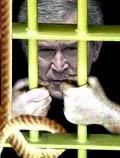| Find |
Saturday, 27 September 2008
Durbin Ties Economic Crisis To Iraq War, Calls For Repeal Of Bush’s Tax Cuts To Pay For $700 Billion Bailout
In an interview today with ThinkProgress, Sen. Dick Durbin (D-IL) directly tied today’s fiscal crisis to the Iraq war:
The Iraq war has driven us deeply into debt. We borrowed $700 or $800 billion to finance that war, mainly from foreign companies, which have flooded our markets with investments — many of them in the big problem areas we talked about, like subprime mortgages. So they have just compounded the problem and we have invited them in, because of the debt that we have. This has been the first president in the history of America to ask for a tax cut in the midst of a war. He made the debt situation even worse.
Durbin also commented on the ballooning size of the debt, noting, “The accumulated debt of America from the beginning of this country to today is about $9.7 trillion.” But between the rescue of Fannie Mae, Freddie Mac, AIG, Bear Stearns, and now the bailout package, “the accumulated exposure added to the national debt over the last several weeks equals the entire debt that we have accumulated in the history of this nation.” Watch it:
The Iraq war — on which the Bush administration is spending $12 billion a month — combined with Bush’s tax cuts, have significantly contributed to the national debt. According to the Center for Budget Policy and Priorities (CBPP), Bush’s tax cuts accounted for 42 percent of the “unprecedented” explosion of the deficit in recent years, which of course adds to the debt. Durbin told ThinkProgress today that he supports repealing Bush’s tax cuts for the wealthiest Americans to help pay for the $700 billion bailout.
As Pat at the Wonk Room has pointed out, these irresponsible policies have meant that the United States has had to turn to foreign investment for financing. Currently, 45 percent of U.S. Treasury securities are owned by foreign nations; other nations owned fewer than 20 percent of these securities as recently as 1994.
Transcript: Read the rest of this entry »
![[Zionazis-1.jpg]](https://blogger.googleusercontent.com/img/b/R29vZ2xl/AVvXsEg_x8DOGucgHQmfJJujuK_oYJdxhEnskhQqt-Og7lSk52HeaDQYzW8NQWfdpHmPgj_FJN0jJ3tz1prR1jVZHdHky2HDQxxcs4LVxX0DtAt3fG0sfRr6MDx7Sz8cJNjl0k0RS9TbCjangQ/s1600/Zionazis-1.jpg)




